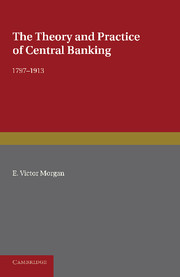Book contents
- Frontmatter
- Contents
- Tables
- Editorial Preface
- Author's Preface
- Chapter I Banks and Banking in the Early Nineteenth Century
- Chapter II The Bank Restriction Period, 1797–1821
- Chapter III Monetary Theory of the Bank Restriction Period
- Chapter IV The First Years of Resumption, the Crisis of 1825, and the Bank Charter Act, 1833
- Chapter V The Horsley Palmer Experiment, and the Bank Charter Act, 1844
- Chapter VI The Currency and Banking Controversy
- Chapter VII The Trial of the Bank Charter Act, 1844-58
- Chapter VIII The Great Boom, 1858-73
- Chapter IX The Great Depression, 1873-96
- Chapter X The Last Years of the Gold Standard, 1897–1913
- Chapter XI Monetary Theory of the Second Half of the Nineteenth Century
- Appendix Changes in Bank rate, 1876-1913, with the Amount of the Reserve of the Banking Department and the “Proportion” on the preceding Wednesday
- Index
Chapter V - The Horsley Palmer Experiment, and the Bank Charter Act, 1844
Published online by Cambridge University Press: 05 June 2016
- Frontmatter
- Contents
- Tables
- Editorial Preface
- Author's Preface
- Chapter I Banks and Banking in the Early Nineteenth Century
- Chapter II The Bank Restriction Period, 1797–1821
- Chapter III Monetary Theory of the Bank Restriction Period
- Chapter IV The First Years of Resumption, the Crisis of 1825, and the Bank Charter Act, 1833
- Chapter V The Horsley Palmer Experiment, and the Bank Charter Act, 1844
- Chapter VI The Currency and Banking Controversy
- Chapter VII The Trial of the Bank Charter Act, 1844-58
- Chapter VIII The Great Boom, 1858-73
- Chapter IX The Great Depression, 1873-96
- Chapter X The Last Years of the Gold Standard, 1897–1913
- Chapter XI Monetary Theory of the Second Half of the Nineteenth Century
- Appendix Changes in Bank rate, 1876-1913, with the Amount of the Reserve of the Banking Department and the “Proportion” on the preceding Wednesday
- Index
Summary
THE NATURE OF THE EXPERIMENT
Between the end of the Restriction Period and the beginning of the “Currency” and “Banking” controversy there occurred, almost without notice, a great change in the attitude of the Bank directors towards the regulation of their issues. In 1819 the senior directors still thought that the function of the Bank was to supply “the legitimate demands of commerce”, and that the only criterion by which to judge of the sufficiency of the circulation was the demand for the discount of first-class commercial bills at what might be deemed a reasonable rate of interest. The Bank formally denied that the note issue could have any effect on the foreign exchanges. In 1827, however, William Ward secured the rescinding of this resolution, and during the next few years there was developed the new rationale of the matter, which was explained to the Committee of 1832 by Palmer.
The connection between Bank of England issues and those of the country banks, between banknotes and prices, and between prices and exchange rates, is now freely admitted, and over-issue is defined in relation to the foreign exchanges:
Over-issue means excess of prices having regard to the prices of other countries. It is quite clear that a bank can only issue legitimately on a demand, and that demand arises upon the prices of the country, but these prices may, by excitement or speculation, be above their relative value with respect to foreign countries; in such case, I maintain an over-issue to exist; and I say this without meaning in the slightest degree to infer a charge against the Banking Interest for that action.
Such an over-issue would show itself in an unfavourable exchange and a demand for gold from the Bank, and the corrective would be a reduction of issues.
- Type
- Chapter
- Information
- The Theory and Practice of Central Banking, 1797–1913 , pp. 100 - 119Publisher: Cambridge University PressPrint publication year: 2013



